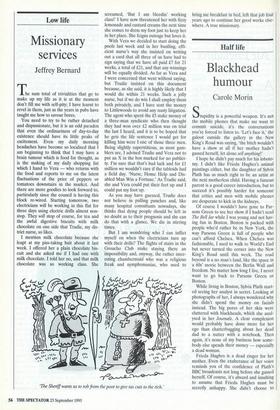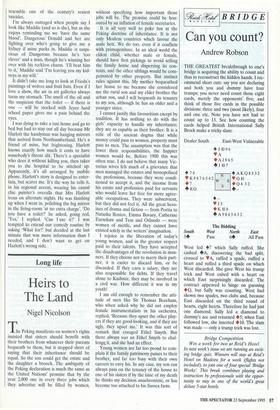Half life
Blackhead humour
Carole Morin
Stupidity is a powerful weapon. It's not the mobile phones that make me want to commit suicide, it's the conversations you're forced to listen to. 'Let's face it,' the galoot outside the gallery in the New King's Road was saying, 'the bitch wouldn't have a show at all if her mother hadn't gassed herself, let alone sell anything!'
I hope he didn't pay much for his loboto- my. I didn't like Frieda Hughes's animal paintings either, but the daughter of Sylvia Plath has as much right to be an artist as the next motherless child. Having a famous parent is a good career introduction, but to succeed it's possibly harder for someone that critics and men with mobile phones are desperate to kick in the kidneys.
Of course I wouldn't have gone to Par- sons Green to see her show if I hadn't read The Bell Jar while I was young and not hav- ing fun in Boston. Boston is packed with people who'd rather be in New York, the way Parsons Green is full of people who can't afford Chelsea. When Chelsea was fashionable, I used to walk to World's End but never turned the corner into the New King's Road until this week. The road beyond is a no man's land, like the space in a 60s' movie between the Berlin Wall and freedom. No matter how long I live, I never want to go back to Parsons Green or Boston.
While living in Boston, Sylvia Plath start- ed seeing her analyst in secret. Looking at photographs of her, I always wondered why she didn't spend the money on facials instead. The big pores of her skin were cluttered with blackheads, which she anal- ysed in her Journals. A clear complexion would probably have done more for her ego than chatterbugging about her dead dad to a nutter with a notebook. Then again, it's none of my business how some- body else spends their money — especially a dead woman.
Frieda Hughes is a dead ringer for her mother. Even the exuberance of her voice reminds you of the confidence of Plath's BBC broadcasts not long before she gassed herself. Of course, it's absurd and insulting to assume that Frieda Hughes must be secretly unhappy. She didn't choose to resemble one of the century's sexiest suicides.
I'm always outraged when people say I look like Maddie (and so is she), but as she enjoys reminding me we 'have the same blood'. Dangerous' Donald and her are fighting over who's going to give me a kidney if mine packs in. Maddie is suspi- cious of Dangerous because he's `too clever' and a man, though he's winning her over with his reckless charm. 'I'll beat him to it,' Maddie said 'I'm leaving you my kid- neys in my will.'
It didn't take me long to look at Frieda's paintings of wolves and fruit bats. Even if I love a show, the air in art galleries always turns my stomach. The smell of the oil and the suspicion that the toilet — if there is one — will be stocked with Jeyes hard school paper gives me a pain behind the eyes.
I was dying to take a taxi home and go to bed but had to stay out all day because Mr Harlott the handyman was hanging mirrors that arrived from Northumberland. He's a friend of mine, but frightening. Harlott knows exactly how much it costs to have somebody's throat slit. There's a specialist who does it without killing you, then takes you to the hospital to be stitched up. Apparently, it's all arranged by mobile phone. Harlott's story is designed to enter- tain, but scares me. It's the way he tells it, in his regional accent, wearing his casual chic painter's overalls that Mrs Harlott irons on alternate nights. He was finishing up when I went in, polishing the big mirror in the living-room `at no extra charge'. `Do you have a toilet?' he asked, going red, `Yes,' I replied. 'Can I use it?' I was tempted to extend our comedy routine by asking `What for?' but decided at the last minute that was more information than I needed, and I don't want to get on Harlott's wrong side.



































































 Previous page
Previous page